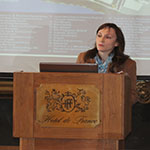Euroacademia Conferences
 Europe Inside-Out: Europe and Europeanness Exposed to Plural Observers (9th Edition) April 24 - 25, 2020
Europe Inside-Out: Europe and Europeanness Exposed to Plural Observers (9th Edition) April 24 - 25, 2020 Identities and Identifications: Politicized Uses of Collective Identities (9th Edition) June 12 - 13, 2020
Identities and Identifications: Politicized Uses of Collective Identities (9th Edition) June 12 - 13, 2020 8th Forum of Critical Studies: Asking Big Questions Again January 24 - 25, 2020
8th Forum of Critical Studies: Asking Big Questions Again January 24 - 25, 2020 Re-Inventing Eastern Europe (7th Edition) December 13 - 14, 2019
Re-Inventing Eastern Europe (7th Edition) December 13 - 14, 2019 The European Union and the Politicization of Europe (8th Edition) October 25 - 26, 2019
The European Union and the Politicization of Europe (8th Edition) October 25 - 26, 2019 Identities and Identifications: Politicized Uses of Collective Identities (8th Edition) June 28 - 29, 2019
Identities and Identifications: Politicized Uses of Collective Identities (8th Edition) June 28 - 29, 2019 The European Union and the Politicization of Europe (7th Edition) January 25 - 26, 2019
The European Union and the Politicization of Europe (7th Edition) January 25 - 26, 2019 7th Forum of Critical Studies: Asking Big Questions Again November 23 - 24, 2018
7th Forum of Critical Studies: Asking Big Questions Again November 23 - 24, 2018 Europe Inside-Out: Europe and Europeanness Exposed to Plural Observers (8th Edition) September 28 - 30, 2018
Europe Inside-Out: Europe and Europeanness Exposed to Plural Observers (8th Edition) September 28 - 30, 2018 Identities and Identifications: Politicized Uses of Collective Identities (7th Edition) June 14 - 15, 2018
Identities and Identifications: Politicized Uses of Collective Identities (7th Edition) June 14 - 15, 2018
The Shrine in Licheń: Redefining Religiosity and Entertainment
-
-

-
Presentation speakers
- Helena Chmielewska-Szlajfer, New School for Social Research, New York and Institute of Applied Social Sciences, University of Warsaw, Poland
- Download presentation
Abstract:
The 1989 political transition in Poland, a peaceful change from Communist form of state and economy to democracy and capitalism, had an enormous influence on other social spheres. The transition opened, or rather reopened, the country to the outside world, especially “the West” which had been mythologized in the Communist period as a place of political freedom, wealth, consumption and culture. One of the spheres where transformation has been particularly noticeable has been Catholic religious practice. While the Polish Church played an undeniably significant role in overthrowing Communist rule, it, too, has been forced to rethink its role in post-1989 Poland. Thus, an example of this change can be found in a brand new shrine built in a small town, Licheń in 2004. The shrine not only boasts a basilica almost the size of that in the Vatican, is famous for being the epitome of kitsch, it also offers novel visual interpretations of Polish history merged with Catholicism and, what’s even more striking, new adaptations to the needs of pilgrims: hotels, cafes, barbecue spaces, ponds and playgrounds – all within the shrine’s walls. I believe the shrine in Licheń is a particularly interesting space of sociological investigation, as it serves as a vivid example of the changes that have been taking place in Poland during the last twenty years in terms of religiosity, interpreting contemporary history and, finally, the “Western” influence of entertainment which can now be found in such bastions of tradition and solemnity as a holy shrine. The emphasis on making difficult and serious topics more accessible has been making them more simple and fun; at the same time it has caused serious reflection to be replaced by entertainment. In its universal goal of evangelization the Church can be seen incorporating elements previously belonging to the sphere of the profane, thus changing the understanding of what is sacred and what it means to practice religion.
-
Related Presentations

















